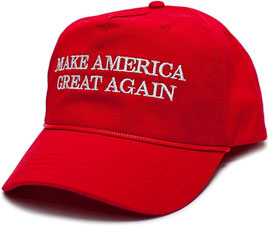Make America Great Again |
17 Jun 2018 |
 Two years ago Donald Trump led a very effective campaign for the office of U.S. president by running on populist messages, virtually all of which he has since ignored or acted against. In this post I want to focus on the slogan that he spread in the form of a red baseball cap, Make America Great Again. To do so I will share my thoughts on the linguistic properties and implications of this short but penetrating catchphrase.
Two years ago Donald Trump led a very effective campaign for the office of U.S. president by running on populist messages, virtually all of which he has since ignored or acted against. In this post I want to focus on the slogan that he spread in the form of a red baseball cap, Make America Great Again. To do so I will share my thoughts on the linguistic properties and implications of this short but penetrating catchphrase.
The slogan’s first word is a verb in its basic form. This verb form can be used for infinitives, imperatives and subjunctives alike. Further context is needed to know which application of make is intended. Interestingly, though, the other three words are not enough context to clarify this question. Rather than being problematic, this ambiguity is very useful to appeal to as many voters as possible. For each so-called mood I will give you possible extensions of Make America Great Again that illustrate what I mean:
- infinitive (Trump speaking): I (and only I) can make America great again.
- imperative (Trump speaking): Whenever someone in power has the choice of serving himself or the country I will command him by saying “make America great again”!
- subjunctive (the voter speaking): I wish a strong leader would make America great again.
This shows how Trump’s slogan is an underspecified sentence similar to
- thank you (I thank you (for doing that)),
- sorry (I am sorry (that you had to go through that)), or
- see you later (I will see you later)
Which mood is Trump trying to convey by this phrase? That is totally up to the voter. Their brain automatically fills in the missing context in whatever way applies to their current situation the most. Similar tactics are employed by political slogans or posters that promise social justice, a better tomorrow, real change or the like. They do not specify what injustice will be corrected, what will become better tomorrow or what will really be changed if the candidate gets into office. Those questions are for the voters mind to answer. The purpose here too is to reach as many citizens as possible. After all, most people are bound to find something in their life unjust or worthy of improvement or change. Trump did not just promise to improve things, he vowed to make them great.
And yes, most Americans would like some positive things to return to the way they were at a time when everything was better, for example the availability of certain jobs before their industries became obsolete, outsourced or automated. For things to become great again, that implies that things were great at one point in history and now they are not anymore. What was great and when was it great? Again, each voter has their own answer to this question. In hindsight everything was better in the good old days because our brains are good at either suppressing or healing from the negative aspects of those situations and leaving mainly positive memories. The truth, however, is that there is no possible returning to earlier conditions. New methods, technologies and mindsets are called for to deal with the challenges of the present.
We skipped the second word, America. Trump made his nationalistic outlook on the world abundantly clear when he railed against Mexicans and other immigrants. His rhetoric often contained a sharp distinction between us and them: They are coming here and destroying or stealing what we have, be that morals, wealth, democracy, etc. Of course the USA is by far not the only country to have these things. In fact, allowing migration and interaction among peoples enriches and brings progress to them all. To define yourself by borders with others is to focus on what you are not. By this mindset you just believe to be better than the others, even if you know next to nothing about their rich culture, history and what is in their hearts. But to Trump the only thing that matters is something he expressed in another slogan, America first.
In summary, you could say that Make America Great Again is such a successful slogan because it is short and strategically leaves gaps in its meaning for everyone to fill in whichever way they see most fit. One spelled-out version of the slogan might be I vow to do everything in my power to cause the United States of America to return to the glory of bygone days when everything about the economy, jobs and our country’s position in global matters was amazing but is no longer now because all previous leaders screwed it up for us. But, of course, that would not fit on a baseball cap.
